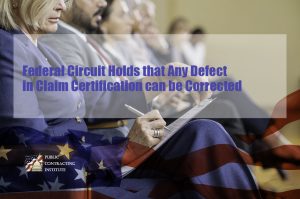This blog has frequently reported on the form and certification required for a claim under the Contract Disputes Act. See “No Magic Words or Form Needed for a Claim” (Nov 19, 2019); “Final Contracting Officer Decision On Claim Does Not Cure Lack Of Certification” (Sep 17, 2019); “Correctible (Defective) Claim Certification” (Mar 5, 2019); “Defective” Claim Certification or “No Claim Certification,” (Nov. 20, 2018) and “How to Sign Your Claim and Certification” (Nov. 28, 2017). Now comes the Federal Circuit and makes it clear that the Contract Disputes Act does not limit defects to those that are “technical” in nature, nor does it limit a contractor’s right to correct a defect if the initial certification was made with “intentional, reckless or negligent disregard for the applicable certification requirements.” DAI Global, LLC, FKA Dev. Alts., Inc. v. Administrator of U.S. Agency for Int’l Dev., No. 2019-1330 (Fed. Cir. Dec. 27, 2019).

The Contract Disputes Act requires, at 41 USC § 7103(a) that an individual authorized to bind the contractor must certify its claim of $100,000 or more, that:
- The claim is made in good faith;
- The supporting data are accurate and complete to the best of the contractor’s knowledge and belief
- The amount requested accurately reflects the contract adjustment for which the contractor believes the Federal government is liable; and
- The certifier is authorized to certify the claim on behalf of the contractor.
In its claim submission to USAID, DAI expressly stated that it was attempting to comply with the Contract Disputes Act, and was sponsoring 5 subcontractor claims, all of which were properly certified by the subcontractor and submitted to the Contracting Officer with the prime contractor’s submission. DAI’s claim submission explained that it was not the party in interest, and had to rely on its subcontractor’s certification. DAI further stated that it had no knowledge that its subcontractor had intentionally failed to comply with the requirements of the Contract Disputes Act or acted in bad faith. .
The Federal Circuit reviewed a decision of the Civilian Board of Contract Appeals (CBCA Nos. 5942-5946) in which the Board had dismissed the five notices of appeal for lack of jurisdiction based on DAI’s failure to certify its claims. The Board held that DAI’s certification “bears no resemblance to the required statutory language,” that only technical errors are correctible, and that DAI made its certification with reckless disregard for the certification requirements. The Board held that these defects were not correctible. The Federal Circuit Court concluded that DAI’s certification was defective, but correctible, and reversed the CBCA’s holding, relying on the plain language of the Contract Disputes Act.
The Court explained that the CBCA had relied on the text of an unenacted version of the CDS, which passed only the Senate. That version stated:
If the certification of a claim pursuant to this Act is technically defective, a court or agency board of contract appeals may permit the certification to be corrected at any time prior to a final decision by the court or agency board of contract appeals unless the failure properly to certify in the first instance was fraudulent, in bad faith or with reckless or grossly negligent disregard of the requirements of the relevant statutes or regulations.
Before passage of the CDA, the italicized language (in two places) was removed from the final statute. The statute as enacted mentions only “defective certification[s]” without reference to the technical nature of the defect or mens rea. See 41 USC § 7103(b)(3). In fact, the plain language of the statute is that a “defect in the certification of a claim does not deprive a court or an agency board of jurisdiction over the claim”—thereby requiring that the CBCA’s contrary conclusion be reversed. Accordingly the case was reversed and remanded to the CBCA.
Takeaway. Do not think that it is appropriate to submit a defective certification for a claim of $100,000 or more that you submit, or a subcontractor’s claim that you sponsor. Even though you may correct a defect, you should avoid the potential litigation, and submit all claims in accordance with the exact statutory language, which is also reproduced in FAR 33.207(c).
For other helpful suggestions on government contracting, visit:
Richard D. Lieberman’s FAR Consulting at https://www.richarddlieberman.com/, and Mistakes in Government Contracting at https://richarddlieberman.wixsite.com/mistakes.

